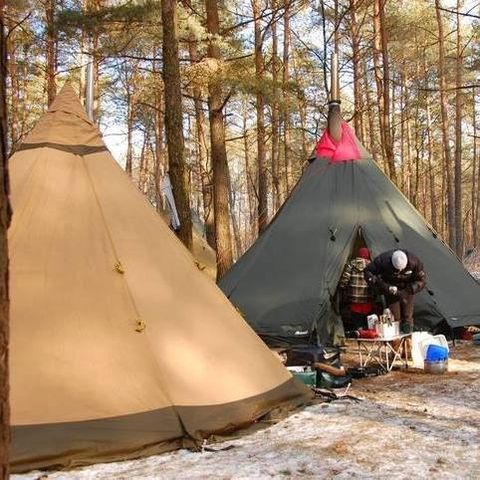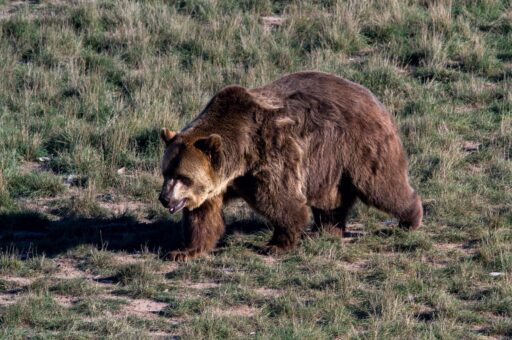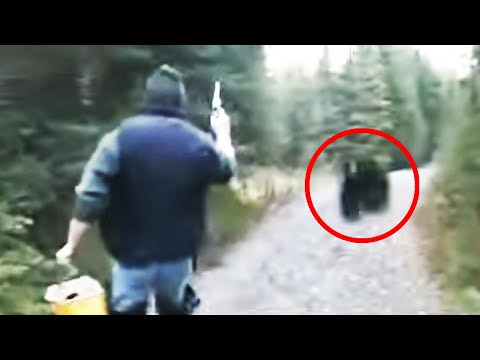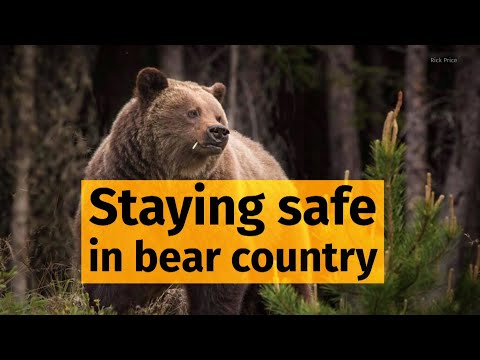


It’s hard to think of an animal that is more charismatic than the grizzly bear. Something about that big, pudgy body, those perfectly fuzzy round ears, inquisitive expression, and all of the antics that we see them get up to in various national parks that makes them undeniably charming.

However, something tells me that those good looks are probably concealing a bad attitude. What we need to know is this: are grizzly bears dangerous?
Yes, grizzly bears are very dangerous. Grizzly bears are huge, fast, and can tear a person limb from limb with ease. You should avoid grizzly bears at all costs, and always stay alert for them when in their territory.
This should not come as a surprise to anyone. As cute as they are, these bears are never cuddly. Luckily, grizzly bear attacks on people are quite rare but they can and do occur. When that happens, death is likely.
You’ll definitely want to steer clear of these massive and majestic bears anytime you are in or around their territory. I’ll tell you everything you need to know about them down below…
Grizzly bears are pretty rare throughout the United States, although they are significantly more common in parts of Alaska and Canada. In the continental US, they’re most commonly encountered in Montana.
Grizzly bears, despite their immense size, sometimes topping 1,000 pounds (453 kilograms), they tend to be cautious and careful as far as people are concerned.
The sight of people, or picking up their scent, is usually enough to send them running away towards safety.
Considering these bears are so skittish, how do they come into contact with people at all?
The answer, of course, is food. Grizzly bears are huge and have truly gargantuan calorie requirements.
These bears have a tremendous sense of smell that they use to sniff out any and all possible sources of food over a wide area.
People provide food for the bears via handouts at parks, hastily abandoned cookouts or picnics and, of course, the leaving of scraps and trash in the wild or in garbage cans and dumpsters.
Hunters, similarly, tend to have run-ins with grizzlies when they bring down another animal. In all cases, the stage is set for disaster when a grizzly is attracted to food and people are still nearby.
Somewhat. Grizzly bears aren’t as truly territorial as black bears, but they might have a home patch of ground they want to keep all to themselves.
In these cases, a grizzly bear might decide to stand and posture or mock charge instead of running away when encountering people.
Sometimes. Grizzly bears tend to get along, but scuffles over food, mating, and defensive behavior on account of cubs are all common.
Yes, they do, although truly close encounters and attacks are rare. As a rule of thumb, once a grizzly bear detects a human being, it will run away.
However, aggression is hardly out of the question…
Yes, many. There have been lots of recorded grizzly bear attacks on human beings stretching back to before the time of the settlers’ arrival in North America.
Those attacks continue today, although they are quite rare in comparison with bygone eras.
Each year in the US, there are about 12 brown bear attacks on people, and on average one attack per year is fatal.
Since the 1970s, there have been around 60 such attacks on humans by bears in the wild, and the vast majority have occurred in Alaska where most brown bears live, though Montana and Yellowstone National park in particular are also relative hotspots.
Your chances of being attacked by a brown bear in any circumstance are surprisingly low, but in historical and modern attacks alike commonly result in the death of the victim: grizzly bears are truly humongous, incredibly strong and well-equipped to take a human being apart piece by piece, and in brutal fashion.
Those who do survive are always maimed, and often crippled for life.
As mentioned, grizzly bear attacks on human beings are rare, but they can and do occur.
Though these huge bears would much rather run away in mind their own business, if they’re surprised at close range, confronted while feeding, feel jealous over a nearby food source or if they have cubs with them then an attack is highly likely.
Stupendously strong. A scientific term, I know. In seriousness, there is no great way to precisely measure the strength of a grizzly bear, either one in the wild or in captivity, but modern estimates place their sheer brute physical strength at several times that of an extremely fit and mature man.
This is easily evidenced by watching the behavior of a grizzly bear in the wild…
They can rapidly excavate hard, rocky soil at a rate that would put heavy equipment to shame, rip branches and bark from trees (with no more effort than you would scratch your leg), and easily dismember large and sturdy animals when feeding.
Grizzly bears are no joke, folks, I promise you!
Yes, they can and they will. One of the most immediately apparent features of a grizzly bear is its large set of jaws, lined with equally large, sturdy teeth that are designed for eating a variety of foods. Some of these foods include bucket-loads of meat and bones!
You are basically bones wrapped in meat, and that means that grizzly bears are perfectly designed to break you apart and eat you. Keep that in mind.
Whatever the situation, a grizzly bear will invariably begin an attack by charging. Now, it is important to realize that sometimes this is a false charge, a bluff designed to get an antagonist or other bear to back off.
Other times, the charge is entirely real and the bear will slam into its target which is bad enough in itself, and it will follow up by swiping with his claws, biting, thrashing trampling and pressing the subject of its higher until it is well and truly dead, or at least convinced so.
Without getting too far off track into the gory details, you can leave those to your imagination, suffice it to say that victims of a grizzly bear attack are well and truly mauled: bones are broken, digits and limbs amputated, skulls are cracked, and much worse.
Many grizzly bear victims die during these attacks or immediately afterwards, and people who do survive are invariably maimed and plenty are crippled.
I can tell you in the strongest possible terms this is one animal you do not want to tangle with.
If you encounter a grizzly bear that is not running away, but it is not yet charging, you don’t want to treat it like a black bear and make a threat display of your own. This will definitely provoke an attack.
Instead, keep still, avoid eye contact and back away carefully, slowly and cautiously but do keep an eye on the bear in case it charges.
If you’ve got bear spray or a gun, it might save your life: Bear spray will regularly stop the charge of a grizzly bear, and a gun might prove to be your very best defense if it is sufficiently powerful and you can keep your nerves about you to land a shot.
If none of this works or if it just isn’t an option and the bear attacks, do not fight back. Do what you can to protect your head and your neck and endure the attack.
Don’t move: the vast majority of the time when the grizzly thinks you are no longer a threat it will leave you be.
Be doubly sure that the bear is gone before you get up and escape, assuming you can get up.
Yes, though this is uncommon. Typically, grizzly attacks on humans result from the bear being surprised at close range, being with cubs or protecting food.
Grizzlies typically don’t want to eat people, and though they will, an attack will only be prompted for that reason if the bear is starving.
Yes, though this is highly unlikely unless you’re in direct contact with a grizzly or eating bear meat.
Grizzlies carry all sorts of internal and external parasites, namely a variety of worms internally and the usual fleas, ticks, and mites externally.
Grizzlies are also known vectors of canine distemper and various canine corona-viruses. So if, however it occurs, you are in close contact with a bear, make sure you wash up thoroughly afterward assuming you are in a state to do so.
 Like what you read?
Like what you read?
Then you’re gonna love my free PDF, 20 common survival items, 20 uncommon survival uses for each. That’s 400 total uses for these dirt-cheap little items!
Just enter your primary e-mail below to get your link:
We will not spam you.
- Advertisement -

 Watch this video on YouTube
Watch this video on YouTube Watch this video on YouTube
Watch this video on YouTube